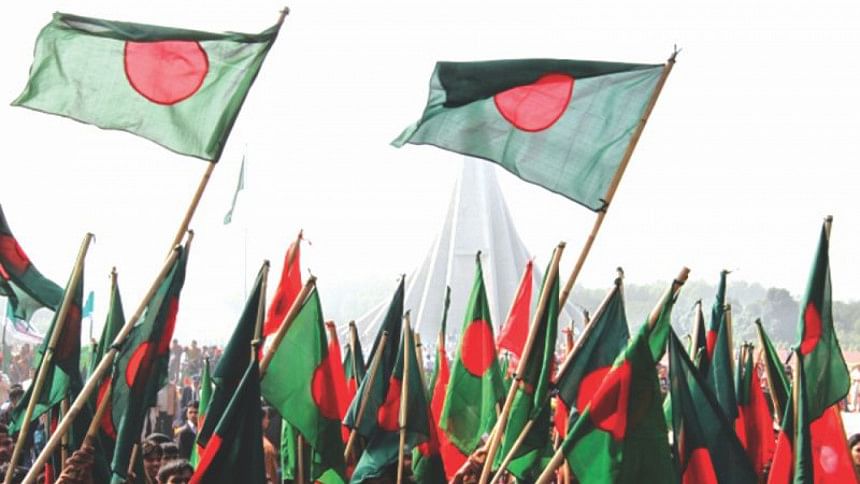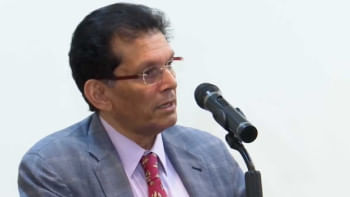Taking a step back to move forward

Bangla-desh celebrated its 48th Independence Day recently, and today we stand proud to be able to call ourselves a sovereign and independent nation. Yet, one questions whether we successfully practise the spirit of our liberation movement, imbued in the ideals of Mujibism as it was called. Socialism, secularism, nationalism and democracy are, in reality, big words which most have no idea about. And such is because, we have never been able to consistently practise what these values represent to the extent for them to be internalised. I am no legal scholar, so I have no ability to delve into these tenets in depth. But as citizens, we must speak about what is visible to the naked eye.
There is no doubt that we should be proud about Bangladesh's eligibility for graduation from least developed country status. But concerns remain. Can we truly say that our legal system is fair in nature? Is our media free of self-censorship or legal censorship? Does the opposition have relative political space to carry forth its basic activities? These are questions to which there is no simple answer. Yet these are real concerns with regard to the future of our development and the future of our democracy.
For various reasons, the current government has initiated a strange, yet widely circulated argument which dents the very ideals of Mujibism. The development-versus-democracy argument is disappointing to say the least—and from what I have learnt by taking basic history courses at university, it is that development only becomes sustainable if it is acquiesced with a democratic agenda.
In economics, there is a concept called middle-income trap, whereby a country gets stuck at a certain level of economic progress, after attaining a certain level of national income. Why does this happen? Well primarily because the country loses its competitive edge and such may arise from both economic and non-economic factors, such as the rule of law in a country, the state of a free press and general price levels. Today, Bangladesh sees its largest opposition party in shatters. Simultaneously, the BNP is trying to recreate its image of being one of two major parties, which can form a government following the next election. BNP Chairperson Begum Khaleda Zia is in jail. Its acting chairperson remains in London. In this climate, one would think that permitting the BNP to hold a mass rally at Suhrawardy Udyan or a meeting in front of their office, would be of little to no concern for the state. Alas, we would be wrong to think such.
During the 1960s, Pakistan's erstwhile President Ayub Khan promoted the notion that his tenure represented the "golden years" of the country. He may have been right in a way—as nominal GDP growth rates during his term have indeed been the highest in Pakistan's history. Nevertheless, it is this very Awami League, which was burdened by the Ayub regime—that too for putting the fundamental rights of Bengalis front and centre. Bangabandhu Sheikh Mujibur Rahman was jailed several times for voicing his constitutional rights and opinions—and the rest is history. Therefore, the Awami League knows very well what political oppression and curbing of political space truly mean in the context of development. It would be wise for the party which led us to independence on the basis of secularism, democracy, nationalism and socialism to practise these values, especially at such a crucial time in our national journey. We do not want to get stuck in a middle-income trap, that too because of the unwise and unforeseen political decisions of two parties which have led Bangladesh in its most significant stages.
If the BNP is indeed allowed to host rallies or participate in some social gatherings to demand the release of their chairperson, it does not hurt the current government in any way. In fact, it will show a refreshing brand of magnanimity of the ruling party, towards an opposition which is depleted by legal, external and internal problems. Staying as quiet as possible over Begum Zia's legal process is also something which seems like the best decision for Awami League policymakers. If this issue is brought up across the political aisle, then the people will undoubtedly question the sheer politicisation of a trial, that too of a three-time former prime minister who happens to be the only other plausible prime ministerial candidate, other than Sheikh Hasina. It creates distrust towards the legal system and in turn does have a social impact on matters of the court.
Given the state of our country today, there are certain lessons we need to take from our day-to-day politics. Development does not automatically equate to a democracy. Today, Bangladesh is on a path of rapid economic advancement, but the ideals of democracy that the country was founded upon seem to be considerably depleted. From engaging with anti-liberation forces, to the modern-day acceptance of fringe right-wing elements in the country, our two main parties have taken the country so far from the secular society that we dreamed of, that attacks on the likes of Zafar Iqbal do not seem surprising anymore.
The inequality in wealth and political power is an issue to which we pay little to no attention, and this again is a sad reality which is camouflaged by the nominal successes of our economy. Nationalism has been used by our political actors as a mechanism to create ideological divides. And this brand of nationalism is not only harmful, but if looked at from a historical lens, has been categorically destructive for societies. In summary, we tend to forget that there is one Bangladesh where people of different income groups, ideals and values all live under the banner of an independent society. Some indicators of these include the division of Bangladesh into a pro-liberation versus anti-liberation camp, increasing post-graduation unemployment levels, treatment of opposition groups as enemies and the fragile state of our banking sector.
If Bangladesh does not get its politics in order in the near future, the problems arising from the Rohingya crisis, attacks on progressive intellectuals, and the long-term worries regarding climate change will only add to the woes holding Bangladesh back from transition towards a sustainable and progressive economy. We do not want to be stuck in a middle-income trap in the immediate future or in the long run. And the responsibility undoubtedly falls towards the incumbent regime to portray a message of unity, in what is expected to be turbulent times in the near future. Let us not stray away from those values which made Bangladesh what it is today—a country which was established on the basis of the right to self-determination, freedom of speech and constitutional privileges.
Mir Aftabuddin Ahmed is a student of economics and international relations, University of Toronto.
Email: [email protected]










Comments